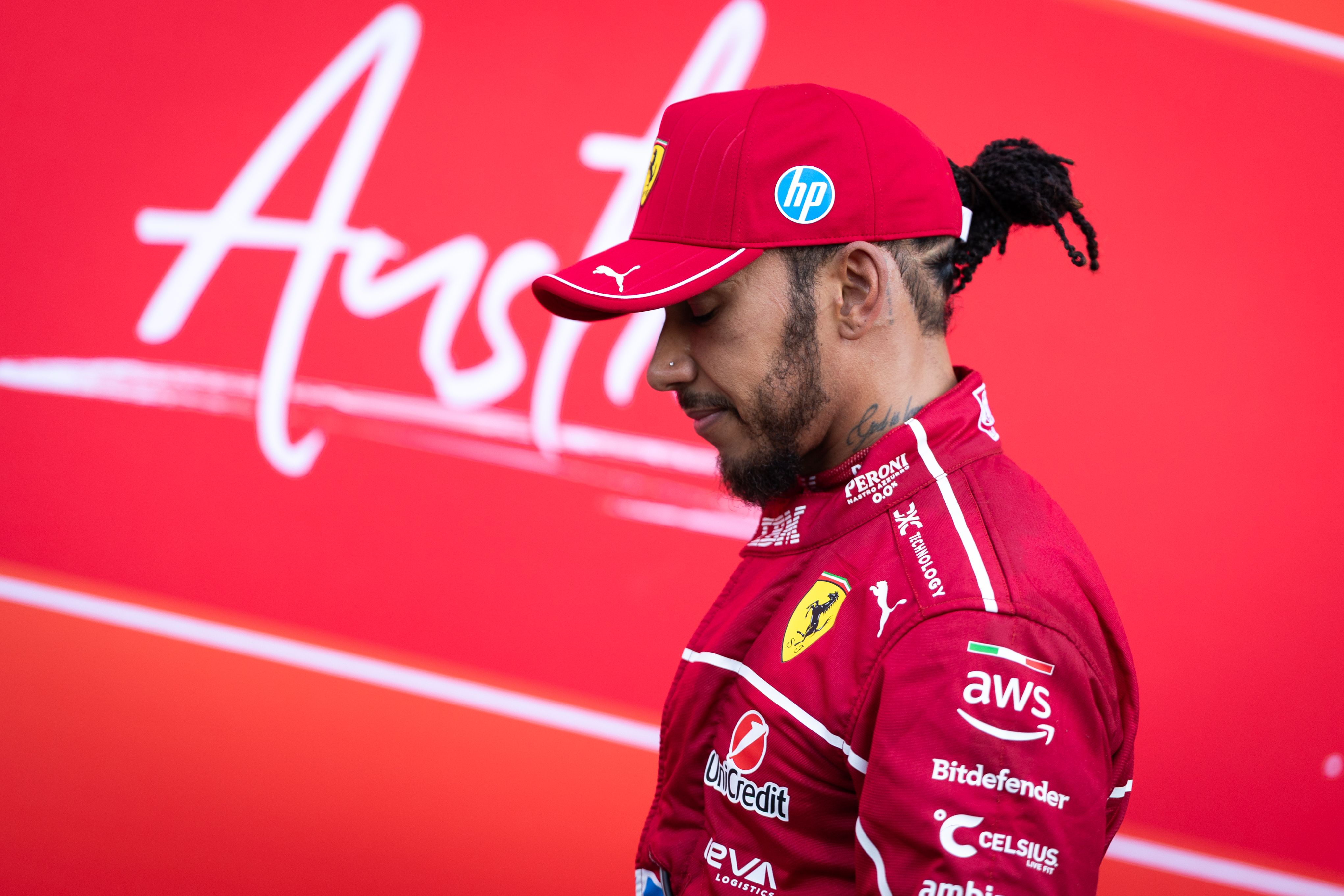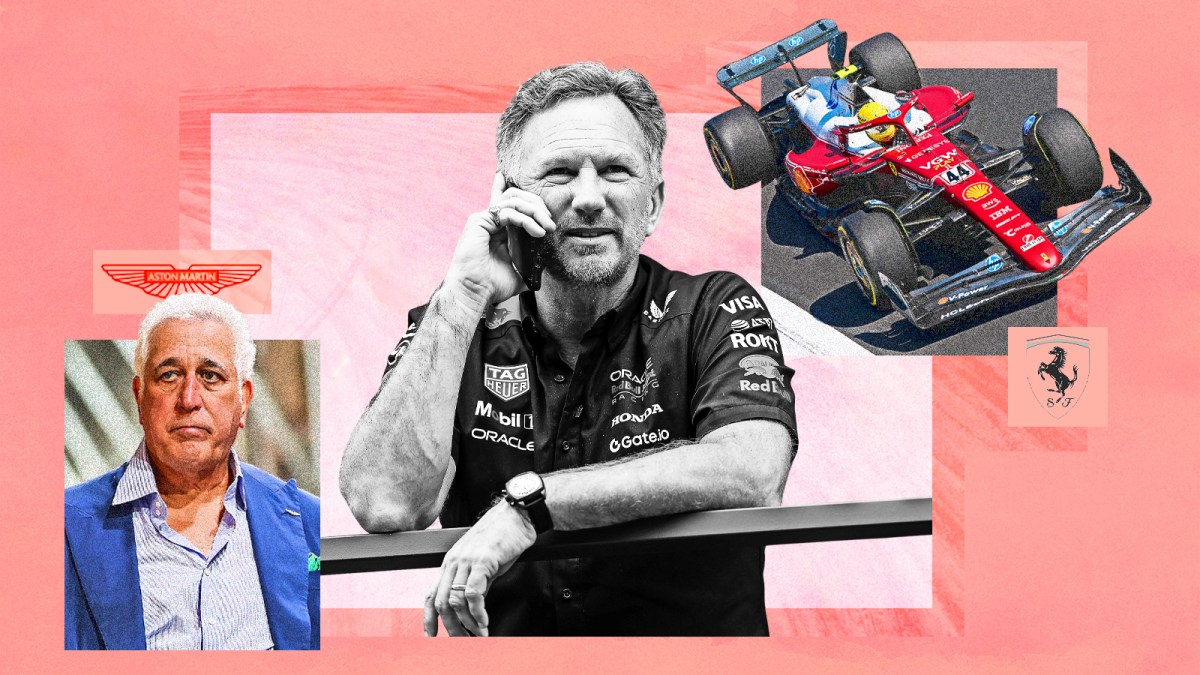Christian Horner was never a shy and retiring member of the paddock in his two decades inside it, but his absence, since being sacked in July, does not appear to have quelled the interest around him.
Barely a race goes by where Horner isn’t mentioned in some way or another: this weekend, Lewis Hamilton was asked several questions about whether he could be his new boss, while in Singapore, various team principals were questioned on whether the 51-year-old could soon be a part of their organisation.
Andy Cowell, the Aston Martin team principal and CEO, appeared particularly exasperated by it. “It looks as though Christian’s ringing up pretty much every team owner at the moment, so you can pass the question along,” he said.

Hamilton was asked several questions this week about whether Horner could become his new boss at Ferrari
SHUTTERSTOCK EDITORIAL
Is that statement true? In the weeks since his departure, The Sunday Times understands that Horner has been approached by several leading investors from around the world, keen to collaborate. Sources suggest he now has enough capital to buy anything from up to 100 per cent of a Formula 1 team, if and when the opportunity were to arise. Those funds would not be enough to buy any of the “big four” teams: McLaren, Mercedes, Ferrari or Red Bull.
It would mean, however, it was a possibility to buy one of several others on the grid — even the smallest teams are thought to be worth about £1.5billion. It has been reported that a Chinese-backed bid for Racing Bulls of more than £2billion was rejected by Red Bull GmbH recently. Despite Cowell’s comments, the possibility of Horner investing in Aston Martin is not entirely over, sources suggest.

Horner cannot return to the sport until next April at the earliest as part of his £80m severance package
GETTY
Therein lies the waiting game that Horner and his investors are playing. Having the funds to buy a stake, or an entire team, is only the first piece of the puzzle. The timing and the project need to neatly fit together. Finances are pivotal in Formula 1, but they are no guarantee, given the health of the sport and the number of people looking to invest.
Sources who may be open to selling their share of a team have told The Sunday Times that they feel it isn’t an optimal time to do so; the sport continues to grow and the 2026 regulations provide a new pecking order, with major changes to power units and chassis. It is simply too difficult to predict who may struggle and be more inclined to sell shares next year.
There is an appreciation on all sides that after the opening stanzas of next season, that picture will be much clearer. Horner cannot return to the sport until April next year, at the earliest, as part of his £80million deal to cut ties with Red Bull.

Taking over at Ferrari may present problems for Horner, since he would have to move his wife Geri Halliwell and family to Italy
ANGELA WEISS/AFP VIA GETTY IMAGES
Perhaps the most-high profile of links for Horner since his departure from Red Bull is that of the prancing horse at Ferrari. The Scuderia may be struggling this season, but there is no prestige greater in the sport than winning in Ferrari red and being the one to do so would be an achievement almost like no other.
The allure of the team is only marginally dulled by the complex political structure that has contributed to its struggles of recent years. There are, undoubtedly, admirers of Horner at Ferrari. But it is understood that the team principal, Fréd Vasseur, retains the support of chairman, John Elkann, and official talks have not taken place with Horner. His gardening leave also makes the dates difficult to align given the coming months are crucial for the success of next season.
Even before he was sacked by Red Bull, Horner highlighted the obvious language barrier that would come with any move to Ferrari, and it is understood those concerns have not changed. It would also probably require Horner to move to Italy, which introduces extra complications given his children and family life with Geri Halliwell.
Replacing Vasseur also would not satisfy what those close to him describe as his biggest desire: having a level of ownership in a team. At Ferrari as team principal, he would be just as vulnerable, or perhaps even more so, than he was at Red Bull.
The departure from the team principal role may be a shock to some, but sources at Red Bull suggest the transition was already being made for next year, had Horner still been in charge.
He had put measures in place so that he would watch sessions from the garage — as Mercedes team principal and CEO Toto Wolff does — rather than on the pitwall. Pierre Waché, Red Bull’s technical director, had taken on many of the team principal-like roles behind the scenes.
Stefano Domenicali, Formula One’s CEO, has met Horner in recent weeks, and so too has Mohammed Ben Sulayem, the FIA president. The latter posted a picture of their dinner on Instagram, with Zak Brown, the McLaren CEO.
Horner and Brown are not the best of friends, to put it politely, and neither was aware of the other’s presence at the dinner until they arrived.
An option that Domenicali and Ben Sulayem would not necessarily be opposed to, is a Horner-led 12th team. That would provide him and his investors with the ultimate clean slate, but the downside of that possibility is that it would realistically take at least three years for the process to be complete, a long time to spend on the sidelines of the sport. The introduction of Cadillac, joining next season, has shown how difficult that process can be.
For now, Horner is the interested observer, six months until he is able to return to work. His eventual destination is not decided, but he could return with more power than ever.

